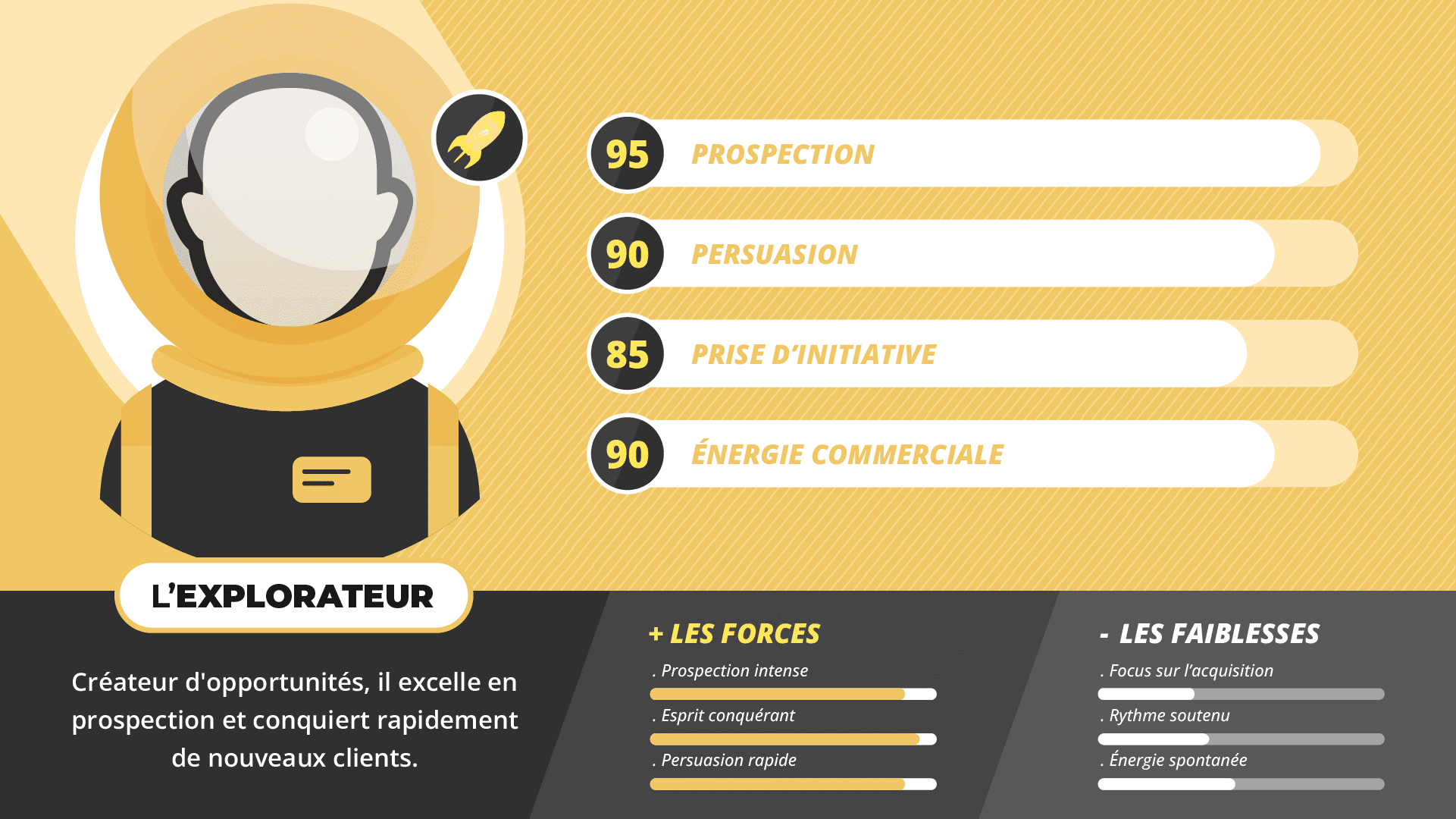In the world of sales, there is a profile that perfectly embodies the spirit of conquest: the Explorer Salesperson. Always on the move, he is motivated by prospecting, acquiring new clients, and rapidly developing his portfolio. His driving force? The challenge. He excels in making contacts, crafting impactful opening lines, and negotiating quickly.
But this constant pursuit of new opportunities has its downside. The Explorer Salesperson tends to prioritize quantity over quality and neglects follow-up with acquired clients, which can deprive them of valuable long-term opportunities. However, with a more balanced approach, they can transform their occasional successes into sustainable and explosive commercial growth.
Discover in detail his strengths, his weaknesses, and how to optimize his potential to maximize his commercial impact.
The Prospecting King: Always one step ahead of opportunities.
The Explorer Salesperson is above all a hunter. They don't back down from any challenge, know how to open doors and create opportunities where others see obstacles. Their main driver? Prospecting. They follow up calls, appointments, and reminders without getting discouraged, convinced that each exchange is a step towards a sale. Making 50 calls a day, pushing to get appointments, and multiplying sales opportunities doesn't scare them.
With an innate sense of persuasion, they have mastered their sales pitch and know how to capture attention from the first few seconds. They set the pace, drive commitment, and are not afraid to challenge their contacts to get them to consider their offers. Their results-oriented approach drives them to always seek to close a sale, making them a formidable salesperson in the initial outreach and rapid conversion phases.
However, his enthusiasm and conviction can sometimes overshadow his listening skills. Instead of seeking to thoroughly understand the client's needs, he tends to impose his point of view and deliver his arguments with an intensity that, in some cases, may lack subtlety. But with a balance between persuasion and active listening, his potential becomes limitless.
The Explorer Salesperson: A Sprinter in a Marathon.
Lack of Follow-up and Loyalty
Focused on acquisition, it often neglects existing customer follow-up, forgetting that a satisfied customer can generate recurring sales and recommendations. The result? A loss of opportunities and commercial instability.
Too Focused on Convincing, Not Enough on Listening
The Explorer masters the art of persuasion but often imposes their point of view without really listening to the client's real needs. This approach can create resistance and harm conversion.
Difficulty Structuring Their Work
Always in the moment, they prioritize action over organization. They may become scattered, juggling appointments without optimizing their sales pipeline, and forgetting to follow up with promising prospects.
How to determine if your profile is that of an Explorer Salesperson?
Are you always on the lookout for new opportunities, and is your motivation driven by challenge and conquest? Do you enjoy prospecting, convincing, and closing deals quickly? If these elements resonate with you, there is a strong chance that you are an Explorer Salesperson.
Ask yourself these questions to be sure:
–Is prospecting one of your greatest strengths?
–Do you prefer signing a new contract over managing long-term customer relationships?
–Do you feel more comfortable opening a sale than following up on it?
–Is your motivation based on immediate results and quick wins?
–Do you tend to skip follow-ups after a deal is signed?
If you answered yes to several of these questions, then you very likely have the profile of an Explorer Salesperson.
Want to be sure? Take our test and discover your sales profile now!
Are you an explorer salesperson?
Commercial Explorateur : Les pistes pour mieux performer.
Cette quête permanente de nouveaux prospects s’accompagne de défis majeurs. Sans une gestion optimisée de son travail, il peut perdre en efficacité et voir ses résultats stagner. Voyons ensemble les principales pistes pour aider le Commercial Explorateur à performer davantage.
Find a balance between prospecting and retention.
Le problème : Obsédé par l’acquisition, l’Explorateur oublie souvent ses clients existants une fois la vente conclue. Il préfère investir du temps dans la recherche de nouveaux leads plutôt que dans le suivi des clients. Résultat ? Une perte de récurrence et un manque de recommandations.
Solution : Structurer son suivi avec un CRM comme HubSpot ou Pipedrive et planifier des relances automatiques après chaque vente. Un simple appel post-vente peut suffire à créer une relation durable et générer des opportunités de revente (upsell & cross-sell).
Don't let refusals discourage you.
Le problème : La prospection implique beaucoup de rejets. Certains commerciaux explorateurs finissent par perdre confiance après une série d’échecs et ralentissent leur activité.
Solution : Accepter que chaque “non” rapproche d’un “oui”. Adopter une mentalité de résilience et analyser ses taux de conversion permet de comprendre où ajuster son pitch. Utiliser des outils comme Gong.io pour revoir ses interactions commerciales peut être un excellent moyen d’identifier les points d’amélioration.
Structure your work to avoid spreading yourself too thin.
Le problème : Trop d’énergie mal canalisée. L’Explorateur peut passer d’un prospect à un autre sans véritable plan structuré, ce qui diminue son efficacité et prolonge inutilement son cycle de vente.
Solution : Mettre en place un processus clair :
-
Bloquer des créneaux dédiés à la prospection (ex : 9h-11h chaque matin pour les appels)
-
Qualifier ses leads pour éviter de perdre du temps avec des contacts peu intéressants
-
Utiliser un pipeline de vente organisé pour suivre chaque étape du cycle de vente et éviter d’abandonner des opportunités en cours de route.
Moving from an opportunistic seller to a strategic seller.
Le problème : L’Explorateur est souvent dans une logique de vente rapide, mais manque parfois de vision stratégique pour optimiser son approche commerciale et bâtir une croissance à long terme.
Solution : Développer une approche plus stratégique en se posant les bonnes questions :
-
Quels sont les prospects qui offrent le plus de valeur sur le long terme ?
-
Quels secteurs ou types de clients ont le meilleur taux de conversion ?
-
Comment puis-je structurer mon discours pour mieux convaincre mes cibles ?
En analysant ses données de vente et en se formant sur des techniques de closing et de relation client, il peut passer un cap et générer un chiffre d’affaires plus stable et récurrent.
How to develop skills as a Prospecting Salesperson?
Prospecting is good. Converting, building loyalty, and structuring your approach is better. To optimize performance, one must refine sales techniques, improve organization, and use the right tools and methods.
What are the key skills to develop? How to avoid mistakes that limit its impact? What tools and strategies can help maximize results?
Improve Your Performance: Skills to develop right now.
Mastering Customer Follow-up
Why? The Explorer excels in acquisition but struggles to build loyalty. Good follow-up helps to transform a one-off into a lasting relationship.
How? Use a CRM (HubSpot, Pipedrive) to automate reminders and never lose sight of a customer.
Improve Your Active Listening
Why? Too focused on persuasion, they risk imposing their pitch without truly understanding the client's needs.
How? Practice the open-ended questioning method and rephrase the prospect's needs before proposing a solution.
Structure Your Prospecting
Why? An effective Explorer doesn't just do « a lot » of prospecting, they do it in a targeted manner.
How?
Identify high-potential prospects to avoid wasting time with unqualified leads.
Block out specific time slots for calls and follow-ups.
Strengthen Your Closing Techniques
Why? They may be excellent at securing appointments, but lose deals due to a lack of structure in the closing.
How? Practice with the Inverted Closing technique:
Confirm the need → “We agree that your priority is X, correct?”
Address concerns → “What is holding you back?”
Create a sense of urgency → “If we finalize today, I can guarantee you X benefit.”
Manage Your Energy and Your Organization
Why? The Explorer can become scattered and lack structure, which leads them to lose efficiency.
How?
Use tools like Trello or Notion to plan and prioritize their actions.
Set weekly goals to maintain an effective prospecting pace without sacrificing client follow-up.
Tools and methods to advance as an Explorer Sales Representative.
Training & Coaching: Train in new sales techniques and ask for regular feedback.
Management Tools: CRM, automation platforms, and organizational tools to optimize work.
A Clear Process: Define a prospecting, follow-up, and reminder plan to avoid improvisation.
A Progression Mindset: Accepting to refine your approach and experiment with new strategies to always improve efficiency.
Why is it important to know your sales profile?
Your sales profile is a strategic lever that allows you to optimize your performance, avoid recurring mistakes, and adapt your approach to sell more effectively.
Maximize your results.
An Explorer excels in prospecting but neglects follow-up. A Challenger influences but can alienate clients. A Relationship-builder builds loyalty but struggles to prospect. Knowing your profile means adjusting your strategy and converting more.
Better manage and motivate your team
Understanding sales profiles allows you to assign the right tasks, boost engagement, and adapt management to maximize productivity.
Build customer loyalty and serve them better.
A salesperson who adapts their approach creates a lasting relationship with their clients, strengthens trust and increases loyalty.
Avoid costly mistakes.
Ignoring one's profile means moving forward blindly. An Explorer who forgets follow-up or a Challenger who neglects listening loses opportunities.






